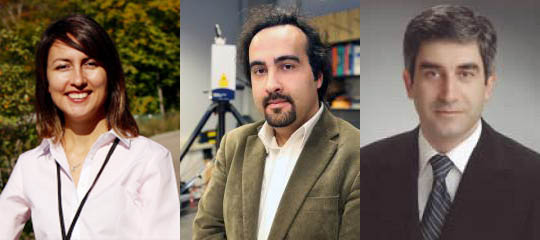
Georgia Tech’s Dr. Alper Erturk, Dr. Levent Degertekin and Ph.D. candidate Serife Tol were awarded the 2017 Energy Harvesting Best Paper Award on behalf of the ASME Adaptive Structures & Material Systems Branch and Energy Harvesting Technical Committee for their research exploring the enhancement of structure-borne elastic wave energy harvesting.
Their paper “Gradient-Index Phononic Crystal Lens-based Enhancement of Elastic Wave Energy Harvesting”, which appeared in the journal Applied Physics Letters, was selected for the award based on overall quality, originality, and impact of research. The award will be officially conferred at the 2017 Conference on Smart Materials, Adaptive Structures and Intelligent Systems held in Snowbird, Utah in September.
The paper explores the enhancement of structure-borne elastic wave energy harvesting, both numerically and experimentally, by exploiting a Gradient-Index Phononic Crystal Lens (GRIN-PCL) structure. The proposed GRIN-PCL is formed by an array of blind holes with different diameters on an aluminum plate, where the blind hole distribution is tailored to obtain a hyperbolic secant gradient profile of refractive index guided by finite-element simulations of the lowest asymmetric mode Lamb wave band diagrams. Under plane wave excitation from a line source, experimentally measured wave field validates the numerical simulation of wave focusing within the GRIN-PCL domain. A piezoelectric energy harvester disk located at the first focus of the GRIN-PCL yields an order of magnitude larger power output as compared to the baseline case of energy harvesting without the GRIN-PCL on the uniform plate counterpart.
Sorife Tol is currently pursuing her PhD in Mechanical Engineering under the supervision of Prof. Alper Erturk and Prof. F. Levent Degertekin. Her PhD research at Georgia Tech has been centered on electricity generation from waves propagating in elastic structures with an ultimate goal to power small electronic components. By eliminating the need for batteries or power supplies, next generation self-powered wireless electronic components can be enabled in various engineering systems ranging from structural health monitoring sensors to medical implants.
Dr. Alper Erturk, Associate Professor, Acoustics/Dynamics, began at Georgia Tech in May 2011 as an Assistant Professor. His postdoctoral research interests included theory and experiments of smart structures for applications ranging from aeroelastic energy harvesting to nonlinear vibrations of electroelastic systems. His Ph.D. dissertation (2009) was centered on experimentally validated electromechanical modeling of piezoelectric energy harvesters using analytical and approximate analytical techniques.
Dr. F. Levent Degertekin, George W. Woodruff Chair in Mechanical Systems and Professor of Mechanical Engineering, Micro and Nano Engineering, worked in the area of acoustic microscopy, ultrasonic sensors for semiconductor processing and modeling of wave propagation in layered media before focusing on microscale devices. Dr. Degertekin began at Georgia Tech in 2000 as an Assistant Professor. His research focuses on understanding of physical phenomena in acoustics and optics, and utilizing this knowledge creatively in the form of microfabricated devices.
